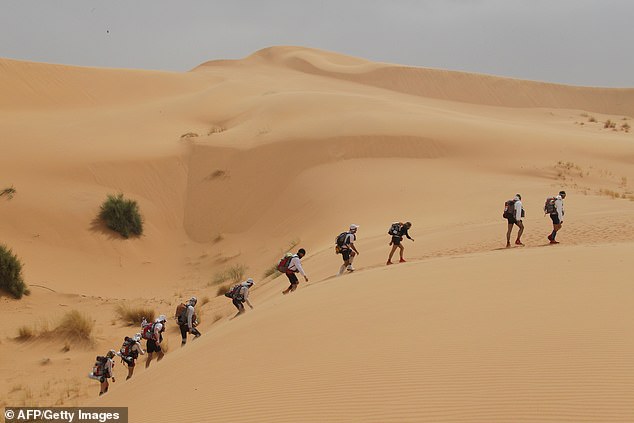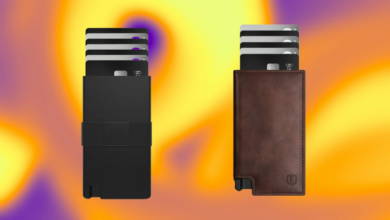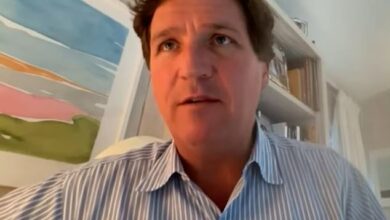REPLY TO CORRESPONDENTS: What are the world’s strangest and most extreme marathon events?

QUESTION: What are the world’s strangest and most extreme marathon events?
In the weird category we have Wales’s Man vs Horse Marathon. This started after Gordon Green, landlord of the Neuadd Arms Hotel in Llanwrtyd Wells, overheard a conversation between two men in his pub. One suggested that man was equal to any horse for a considerable distance across the country.
In 1980, he put this to the test with the introduction of the marathon, which pits runners against horses on a rugged 22-mile course that combines road, trail and mountainous terrain. Horses usually win, but not always. In 2004, Huw Lobb became the first runner to beat the horses, winning £25,000 in prize money.
During the Big Five Marathon in Entabeni Game Reserve, South Africa, first held in 2005, runners cross the savannah among the ‘big five’ animals: lions, leopards, rhinos, elephants and buffalos. You probably don’t want to be the last.
There’s the Beer Lovers’ Marathon in Liège, Belgium, a 26-mile “pub crawl” where participants stop at beer stations selling local beers, which are famous for their spirits.
During the Marathon du Medoc in Bordeaux, France, runners in costume traverse the vineyards, stopping frequently at wine tasting stations and sampling gourmet dishes such as oysters along the way.

Participants cross the erg Znaigui during the second stage of the 26th edition of the ‘Marathon des Sables’, on April 4, 2011, some 300 kilometers south of Ouarzazate in Morocco

Athletes race past the vineyards of Medoc, near Pauillac, during the 30th Marathon du Medoc, a 42.2km circuit in the Medoc wine region near Bordeaux in southwestern France
The toughest has to be the Marathon des Sables, a grueling multi-stage ultra-marathon held annually in the Sahara Desert in Morocco. Participants run a consecutive series of marathons totaling 240 kilometers over six days in extreme heat, with temperatures up to 50 degrees Celsius. Runners carry their own supplies, including food, clothing and sleeping gear.
During the Antarctic Ice Marathon, runners battle extreme cold and strong winds in a desolate frozen landscape.
Greg Beaumont, Ipswich, Suffolk
QUESTION: What was the first TV telethon to air?
The first telethon was a 16-hour event broadcast by NBC in America in 1949 and hosted by all-round entertainer Milton Berle. It raised $1.1 million for the Damon Runyon Cancer Research Foundation.
The show set the tone for telethons: a big-name host, phone operators to collect pledges, celebrity appearances and impassioned pleas for donations. It was Jerry Lewis’ annual Labor Day Telethon for the Muscular Dystrophy Association that popularized the telethon. He hosted from 1966 to 2010.
Britain took a while to catch on. Our first was the Thames Telethon on October 2, 1980. It lasted ten hours and was presented by Jimmy Young, Joan Shenton and Rolf Harris. Shortly afterwards, on 21 November 1980, the BBC held the first national telethon for Children in Need. It was presented by Terry Wogan, Sue Lawley and Esther Rantzen.
Ruth Worthington, Clacton-On-Sea, Essex
QUESTION: What became of Hans Hotter, Adolf Hitler’s favorite singer?
Hans Hotter (1909-2003) was a celebrated German operatic bass-baritone known for his masterful interpretations of Wagner roles. Hotter was associated with roles such as Wotan in The Ring Cycle, the Dutchman in The Flying Dutchman and Hans Sachs in Die Meistersinger von Nurnberg.

Hotter’s career intersected with the Third Reich, during which time he enjoyed official favor. Hitler’s adoration for Wagner extended to performers of Wagner’s works
Hotter’s career intersected with the Third Reich, during which time he enjoyed official favor. Hitler’s adoration for Wagner extended to performers of Wagner’s works, and Hotter was among those considered exemplars of the idealized Germanic artistic tradition.
Hitler revered Wagner’s operas for their themes of heroism, mythology, and nationalism, and appreciated Hotter’s ability to embody the grandeur and intensity of these roles. Hotter himself, however, was not a member of the Nazi party and is said to have ridiculed the German leader in private. He refused to appear at the 1940 Bayreuth Festival, which was organized by devoted Hitler admirer Winifred Wagner. He had considered emigrating to the US, but stayed to protect his family.
Although Hotter’s career benefited from the regime’s cultural policies, his legacy is still defined by his artistry rather than his association with the era.
After the Second World War, Hotter sang in Covent Garden in 1948 and from 1952 he began a twelve-year association with the Bayreuth Festival under the direction of Wieland Wagner, Winifred’s son.
Hotter had a fifty-year relationship with the Vienna State Opera, where he continued to sing and perform in Paris, Buenos Aires, Amsterdam and numerous other cities until the 1980s.
Neil Parks, Cheltenham, Gloucestershire




